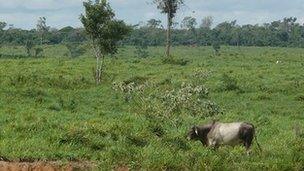Brazil Congress delays forest vote law amid wrangling
- Published

Brazil is one of the world's biggest food producers
The Brazilian Chamber of Deputies has delayed voting on controversial legislation that stipulates how much land farmers must preserve as forest.
After tense discussions, legislators decided to put back attempts to hold a final vote until Wednesday.
Farmers' groups say the bill will promote sustainable food production.
But environmentalists say the new forest code will be a disaster and lead to further destruction of the Amazon.
The revamp of the forest code has been discussed for months, with the bill undergoing numerous changes.
It was passed by the Senate in December.
Legislators held discussions throughout Tuesday to try to put the bill to the vote but the session was adjourned close to midnight.
"We all know and we were all witnesses today that there is a certain tension surrounding this issue," said Marco Maia, president of the Chamber.
He said an extraordinary session would begin at 11:00 local time (14:00 GMT) on Wednesday.
But Mr Maia admitted that a long day of debating lay ahead.
"We are far from building an accord," he said.
The farmers' lobby, the Brazilian Confederation of Agriculture and Livestock (CNA), says the revised code will create rigorous legislation to allow for food production while protecting the country's environmental heritage.
"The environment is essential for agriculture. We are more dependent on nature than any other human activity and we want our forests to be left standing," said Senator Katia Abreu, president of the CNA.
Dilemma
Under the Forest Code, which dates back to 1965, landowners must conserve a percentage of their terrain forested, ranging from 20% in some regions to 80% in the Amazon.
This provision remains, but environmentalists say other changes to the code will erode key protections.
Some farmers would be able to cultivate land closer to riverbanks and hilltops.
The bill also provides an amnesty from fines for illegally clearing trees before July 2008, although larger landholders would have to replant most of the cleared area or preserve the same amount of land elsewhere.
"If [the bill] is approved, it's signalling that environmental crimes pay, that they can be committed and there will be no punishment," Greenpeace spokesman Paulo Adario told the Associated Press news agency.
President Dilma Rousseff has said she will veto the parts of the bill that she opposes.
She is facing a political dilemma, correspondents say, as she seeks to combine support for economic development, but also uphold environmental pledges made during her election campaign in 2010.
- Published7 December 2011
- Published6 December 2011
- Published5 July 2011
- Published25 May 2011